- Home
- Mark R. Levin
Ameritopia: The Unmaking of America Page 5
Ameritopia: The Unmaking of America Read online
Page 5
Each city has a maximum of 6,000 individuals within its borders, organized into families (63, 76). If, in any city, the number of citizens grows beyond 6,000, the excess inhabitants are forcibly relocated to other cities with fewer than the maximum number, or moved into the countryside to form a new town. “This measure or number is easily observed and kept by putting them that in fuller families be above the number into families of smaller increase. But if chance be that in the whole city the store increase above the just number, therewith they fill up the lack of other cities. But if so be that the multitude throughout the whole island pass and exceed the due number, then they choose out of every city certain citizens and build up a town under their own laws in the next land where the inhabitants have much waste and unoccupied ground, receiving also of the same country people to them, if they will join and dwell with them…” (77).
Outside of each city are identical farms with no fewer than forty people on each farm, in addition to two bondmen, or slaves. Each farm is ruled by the oldest man and woman in the family (63). Every thirty farms is ruled by a head bailiff, called a Phylarch in the Utopian language, who is elected annually by the families (68). At harvest time each year, the Phylarchs tell the magistrates within the city how many additional people will be necessary to harvest the crops; the magistrates order the requested number of citizens within the city to assist with the harvest. “When their harvest day draweth near and is at hand, then the phylarchs, which be the head officers and bailiffs of husbandry, send word to the magistrates of the city what number of harvest men is needful to be sent to them out of the city. The which company of harvest men, being ready at the day appointed, almost in one fair day dispatcheth all the harvest work” (65). The same sort of draft of citizens is also initiated by the magistrates to repair the island’s roads, if need be (76).
Because every citizen of Utopia is expected to be intimately familiar with farming and agriculture, every two years twenty people from each farm are ordered to live in the neighboring city. Every home in every city is required to have a vegetable garden (67). At the end of the two-year period, the city and farm dwellers switch places (64).
Each family has between ten and sixteen children (77). Women may not marry before the age of eighteen, men before the age of twenty-two (108). Family members in excess of that limit are required to join another family. Each family is trained in a specific trade or vocation, with the children expected to carry on the specialty from generation to generation. Individuals are allowed to pursue other interests, but they must join another family that specializes in the desired vocation—that is, if you want to change vocations, you must also change families. “But if a man’s mind stand to any other, he is by adoption put into a family of that occupation which he doth most fantasy, whom not only his father but also the magistrates do diligently look to, that he be put to a discreet and an honest householder” (70, 71).
Recall that each year, every thirty families choose the Phylarch. Every ten Phylarchs elect a chief Phylarch known as a Tranibore. There are two hundred Phylarchs in each city. They elect the Prince. The Prince rules for life but cannot pass on his post to his offspring. The Phylarchs elect a new prince upon the death of the old one. The Tranibores serve as an advisory and governing council with the Prince. They meet every third day. Their meetings are conducted in secret and members are prohibited from discussing council business in public under penalty of death—with one exception: the most serious issues are taken by the Tranibores to the Phylarchs, who in turn bring the matter to their respective families. The families’ decisions are then brought back to the council of Tranibores for final action. An island-wide council composed of three of the wisest men from each of the cities assembles annually in the capital city of Amaurote. By law, on Utopia the governing council must debate three days on every issue brought before it. Moreover, no dispute or issue may be voted on by the council the same day in which it is raised for debate (63, 68, 69). Consequently, in Utopia, More creates the outline of a representative governmental structure. However, it is largely irrelevant, given the established dictates affecting minute details of daily life.
Citizens may not travel either within or beyond their city’s limits without a passport issued by the Prince. If a person is caught traveling without a passport, they can be punished severely (82). Each house in Utopia’s fifty-four cities is identical to every other house and no one owns the home or farm on which they live. There is, in fact, no such thing as private property of any kind on Utopia (67).
Utopia’s economic egalitarianism requires everyone to turn over everything they produce to central storehouses, from where they, in turn, get whatever they require to live. “Thither the works of every family be brought into houses, and every kind of thing is laid up several in barns or storehouses. From hence the father of every family or every householder fetcheth whatsoever he and his have need of then carrieth it away with him without money, without exchange, without gage, pawn, or pledge. For why should any thing be called unto him, seeing there is abundance of all things and that it is not to be feared lest any man will ask more than he needeth? For why should it be thought that that man would ask more than enough, which is sure never to lack?” (78) There are no poor people. “This fashion and trade of life being used among the people, it cannot be chosen but they must of necessity have store and plenty of all things. And seeing they be all thereof partners equally, therefore, can no man there be poor or needy” (84). Indeed, in Utopia, money is considered the source of much evil. For that reason no one is paid for their labor in currency, which is banned from the island. Gold, silver, and other precious metals have no value. Instead, they are used in chamber pots and other items used for the less than savory personal tasks in daily life (86). “[A]ll the desire of money with the use thereof is utterly secluded and banished, how great a heap of cares is cut away! How great an occasion of wickedness and mischief is plucked up by the roots! For who knoweth not that fraud, theft, ravin, brawling, quarreling, babbling, strife, chiding, contention, murder, treason, poisoning, which by daily punishments are rather revenged than refrained, do die when money dieth? And also that fear, grief, care, labors, and watchings do perish even the very same moment that money perisheth? Yea, poverty itself, which only seemed to lack money, if money were gone, it also would decrease and vanish away” (144).
As noted earlier, daily life in Utopia is strictly regimented. The chief duty of the Phylarchs is to ensure that the people follow the schedules established for them each day and that no one is idle (71). There is only a six-hour workday, three hours in the morning and three hours in the afternoon, after a mandatory two-hour rest following lunch. Bedtime for everyone is 8 P.M. All must sleep for eight hours (71). In their off hours, outside of work and sleep, Utopians are expected to pursue whatever hobbies or avocations interest them but which will also contribute to the greater good of the island nation. Meals are taken communally at appointed times in a great hall in each neighborhood. There are also strict requirements about where the men, women, and children sit. It is legal for an individual to eat the occasional fruit or vegetable from the gardens that are grown in the backyards of every home (80).
People all wear identical clothing and it is against the law to affect adornments of any kind. “For their garments, which throughout all the island be of one fashion … and this one continueth for evermore unchanged, seemly and comely to the eye, no let to the moving and wielding of the body, also fit both for winter and summer—as for these garments (I say) every family maketh their own” (70). The only exceptions are at festivals, where everyone but the priests wear white (139).
Every religion on the island must recognize a single, supreme, ubiquitous god. Priests within the leading religion on the island are among the most highly esteemed people in the utopian society (134). The churches, which are limited in number but very large and elegant, are open to all worshippers. “The common sacrifices be so ordered that they be in no derogation nor prejudice to any
of the private sacrifices or religions. Therefore, no image of any god is seen in the church, to see to the intent it may be free for every man to conceive God by their religion after what likeness and similitude they will. They call upon no peculiar name of God, but only Mythra, in the which word they all agree together in one nature of the devine majesty whatsoever it be” (137, 138).
Since there is no private property on the island, and no currency for domestic use, every health-care service is free. Four hospitals are strategically located outside each city. They are great structures, lavishly appointed and extremely well equipped. “For in the circuit of the city … they have four hospitals, so big, so wide, so ample, and so large, that they may seem four little towns.… These hospitals be so well appointed, and with all things necessary to health so furnished … there is no sick person in all the city that had not rather lie there than at home in his own house” (79). However, death is not feared but celebrated among Utopians. People who die have an opportunity to meet their maker (131). Therefore, individuals who suffer from incurable diseases or fatal conditions, and who are no longer of use to the society in general, are encouraged to commit suicide to ease their pain and alleviate the burden they represent to island civilization. “They that be thus persuaded finish their lives willingly, either with hunger, or else die in their sleep without any feeling of death” (107).
Although private property, currency, and precious metals have no value in the utopian world, the country does maintain the monies that are paid by cities and nations with which Utopia trades. These funds are kept to pay for the use of mercenaries to fight the odd war with other cities and nations that may occasionally arise. Also, Utopia does not engage in the contemporaneous practices of appropriating the wealth or enslaving the civilian populations of the nations it conquers. Only the combatants who actually fought in battle against Utopia’s forces are taken into slavery.
Nearly five hundred years after Utopia was first published, scholars still debate whether it was intended to be, in whole or part, a serious statement of political theory, More’s preferred ideal society, or a fiction supposedly built on humanism. Whatever his intended approach, More obviously meant for his work to have meaning, which it has for centuries.
The crux of More’s critique, delivered through Hythloday, seems clear—his revulsion with the injustices and inequities of society at the time: “Here now would I see if any man dare be so bold as to compare with this equity the justice of other nations, among whom I forsake God if I can find any sign or token of equity and justice. For what justice is this, that a rich goldsmith, or an usurer, or, to be short, any of them which either do nothing at all, or else that which they do is such that it is not very necessary to the commonwealth, should have a pleasant and a wealthy living either by idleness or by unnecessary business, when in the meantime poor laborers, carters, ironsmiths, carpenters, and plowmen, by so great and continual toil as drawing and bearing beasts be scant able to sustain, and again so unnecessary toil that without it no commonwealth were able to continue and endure one year, should yet get so hard and poor a living, and live so wretched and miserable a life, that the state and condition of the laboring beasts may seem much better and wealthier? For they be not put to so continual labor, nor their living is not much worse, yea, to them much pleasanter, taking no thought in the mean season for the time to come. But these silly poor wretches be presently tormented with barren and unfruitful labor, and the remembrance of their poor, indigent, and beggarly old age killeth them up. For their daily wages is so little that it will not suffice for the same day, much less it yieldeth any overplus that may faily be laid up for the relief of old age” (142).
Moreover, for More, the individual’s pride is his greatest malady and destructive of the sameness and oneness of purpose so crucial to a just society. “And I doubt not that either the respect of every man’s private commodity or else the authority of our savior Christ … would have brought all the world long ago into the law of this weal public, if it were not that one only beast, the princess and mother of all mischief, Pride, doth withstand and let it. She measureth not wealth and prosperity by her own commodities, but by the misery and incommodities of others; she would not by her good will be made a goddess, if there were no wretches left over whom she might, like a scornful lady, rule and triumph, over whose miseries her felicities might shine, whose poverty she might vex, torment, and increase by gorgeously setting forth her riches. This hell-hound creepth into men’s hearts and plucketh them back from entering the right path of life and is so deeply rooted in men’s breasts that she cannot be plucked out” (144, 145).
More’s response is to fabricate an egalitarian society that claims to provide for all wants and needs on an equal basis by expunging humanness from the human being and suppressing individual pride—that is, free will and personal fulfillment—for the good of society. In Utopia, the individual is not trusted to care for himself. His highest value is that of an insipid worker compliantly obeying orders. His personality must be reengineered. His own desires and happiness, therefore, are made indistinguishable from those of every other individual. More controls the individual and his environment, which extends to the most basic aspects of life.
Despite the establishment of representative councils, the power of the state is nearly absolute, for the problem, as usual, is not the utopian fantasy, which is self-evidently prophetic, but the flawed individual who is unable, on his own, to live up to it. As a result, people are forced to work on farms, move to different homes, and join other families. They must wear the same type of clothing, live in the same style homes, and reside in similarly designed towns. They eat, sleep, and dress as told. The individual is constantly prodded, yanked, and pushed to do that which he may not wish to do. He is even encouraged to self-euthanize when his illness or weakness interferes with his ability to contribute to society. But for those few who become, for example, Phylarchs and Tranibores, all citizens must be involved in farming and other forms of manual labor. Thus, even more thoroughly than the Republic, More’s Utopia demands conformity, uniformity, and communal living for nearly all of its inhabitants. Apart from its religious component, it is similar in kind to, and a forerunner to, the “utopian socialism” in The Communist Manifesto and its emphasis on radical egalitarianism.
Of course, Utopia is no paradise. It substitutes one evil for another. Like the Republic, Utopia misapprehends man’s nature. Rather than nurture it, Utopia suppresses it. Among other things, More does not amply tackle the necessity of his ideal society to establish a far-reaching administrative and enforcement apparatus to oversee his society’s intricate rules. While he metes out punishment for certain indiscretions and offenses, the coercion and repression required to impose order must be more elaborate and brutal than More acknowledges. For example, surely stubborn resistance by some if not most families to the forced separation of its members, or the relocation of citizens from cities to farms to work the fields whether they want to or not, would require police-state tactics to effectuate. It is reminiscent of Mao Zedong’s Great Leap Forward, which was instituted more than 440 years later, resulting in the death of millions of Chinese. Furthermore, while Utopia provides a form of representative government, More does not explain how such a government can exist within the framework of a thoroughly controlled cultural and economic climate, the purpose of which is to denude the citizen of his individuality (pride); or whether it can exist as the carefully planned society More intended should the families vote for representatives to undo the supposed ideal parts of his society.
Utopia’s peninsula is also turned into an island for the purpose of isolating its citizens from the rest of the world, with some exceptions. Mobility within and outside the island is monitored and strictly regulated by the Prince himself. By severely limiting external influences and interactions of most kinds, More’s paradise would undoubtedly stagnate and regress—economically, intellectually, scientifically, technologically, culturally, etc.—for the
flow of information and access to knowledge that contributes to the vitality, growth, and energy of a society are largely proscribed, much like many of the communist regimes of the twentieth and twenty-first centuries.
Although More was an enormously courageous man of deep faith, executed by King Henry VIII for his principled refusal to disparage the Roman Catholic Church, and although his invention, Utopia, was, I believe, intended as a humane response to the contemporary society that undoubtedly troubled him, More was no more successful than Plato. Utopia is a tyrannical society, destructive of individual sovereignty and free will, with many of the attributes of a communist state.
CHAPTER FOUR
THOMAS HOBBES’S LEVIATHAN AND THE ALL-POWERFUL STATE
THOMAS HOBBES WAS A partisan of the English royalty who was appalled by the series of civil wars between the English Royalists and Parliamentarians, religious turmoil, and general anarchy that led to the execution of Charles I. He fled to France where, in 1651, he wrote Leviathan,1 which was influenced by what he had observed and experienced.
Hobbes argued that as men live in a constant state of fear, anxiety, and conflict, they could not be trusted to govern themselves. As such, a “Sovereign” must be given absolute power over men (“Subjects”) to protect them against themselves and outside invaders (a Sovereign can either be a single person such as a Monarch, or an assembly of men). The Sovereign was an all-powerful Leviathan—a totalitarian state with a vast bureaucracy controlling the lives of its Subjects.
Submission to the Leviathan (or Commonwealth) meant transferring one’s rights to the Sovereign. That way, Hobbes believed men could live in peace, stability, and contentment. The rights transferred included, among others, control of the judicial system (what is right or wrong), control of Subjects’ free will (what Subjects could or could not do), control of Subjects’ possessions (what goods the Subject could enjoy), distribution of materials such as land, and control over foreign trade. Hobbes described this relationship as a social contract or compact.

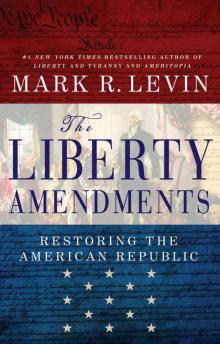 The Liberty Amendments: Restoring the American Republic
The Liberty Amendments: Restoring the American Republic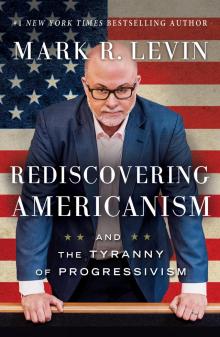 Rediscovering Americanism: And the Tyranny of Progressivism
Rediscovering Americanism: And the Tyranny of Progressivism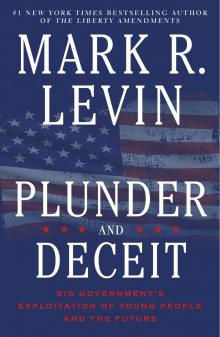 Plunder and Deceit: Big Government's Exploitation of Young People and the Future
Plunder and Deceit: Big Government's Exploitation of Young People and the Future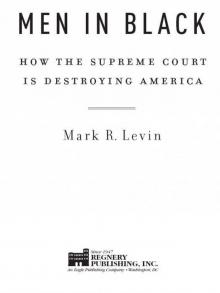 Men in Black: How Judges Are Destroying America
Men in Black: How Judges Are Destroying America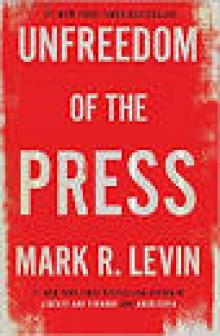 Unfreedom of the Press
Unfreedom of the Press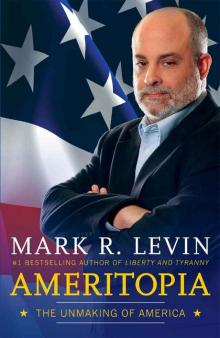 Ameritopia: The Unmaking of America
Ameritopia: The Unmaking of America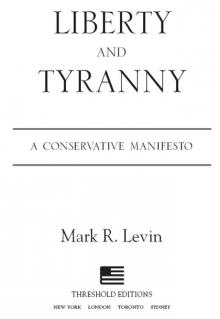 Liberty and Tyranny
Liberty and Tyranny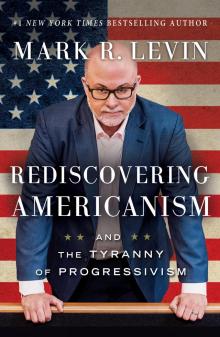 Rediscovering Americanism
Rediscovering Americanism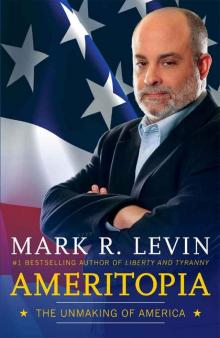 Ameritopia
Ameritopia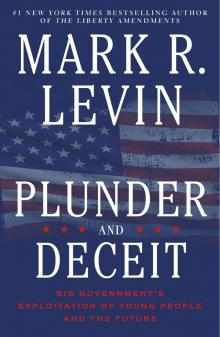 Plunder and Deceit
Plunder and Deceit